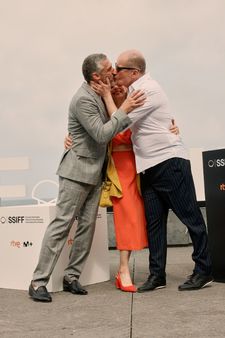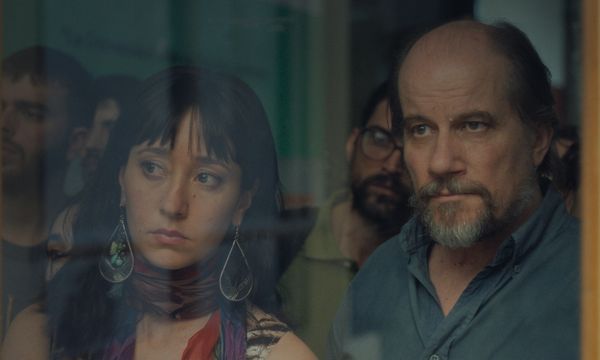Argentinian actor Marcelo Subiotto has spent much of his life in supporting roles but has been gradually making his presence felt more on the international stage with the likes of 2021’s Dusk Stone, which played at both Venice and San Sebastian Film Festivals. Droll comedy Puan - about hapless philosophy professor Marcelo (played by Subiotto) who finds himself vying for a top job against a former classmate Rafael (Leonardo Sbaraglia) after the unexpected death of his mentor - is likely to further cement that.
The film, which was written by María Alché and Benjamín Naishtat specifically to give Subiotto the lead, saw the actor take home the Silver Shell for performance at this year’s San Sebastian, as well as winning the Silver Shell for best script.
 |
| Leonardo Sbaraglia, Marcelo Subiotto and their co-star Mara Bestelli in San Sebastian Photo: Jorge Fuembuena/Courtesy of San Sebastian Film Festival |
Subiotto loves the mix. He says: “He’s someone who’s able to think, for example, but at the same time he's doing all those clumsy, silly things such as, standing on his head, so I think that turns the character into somebody attractive.”
He says his character's life reflects that of his homeland. “The situation in Argentina which is portrayed is not is not easy, daily life is not easy,” he says. “And the life of academia is not easy at all. Also our lead character is going through a difficult situation. He is grieving, he has lost his mentor. So all that is hard, but I think it is very important to treat it like a comedy. I think that is interesting. Also, you know, when the audience in the movie theater is laughing, it is precisely when the character is going through the worst situations. So I think that is a very nice choice.”
It wasn’t just standing on his head that Subiotto had to rehearse, “I had to learn how to sing. I also talked to philosophy professors so as to be able to understand those texts on those lessons that I was giving.”
The philosophy is just one element of a film that also features a lot of physical comedy, including a very unfortunate encounter with a baby’s nappy, which creates a sort of dual track of humour in the film.
“Marcelo is somebody who talks a lot and he expresses himself very well but only in front of his pupils. It is there where he becomes somebody who acquires some weight. In his daily life, he's shy, he's not able to solve many daily situations, he doesn't have any social skills, social abilities. So maybe that is also a criticism of academia. They have all that knowledge in their head, but they do not have that knowledge in their body. They are not able to express it in a different way in real life, it is all there in their brain.”
We come to see that while Marcelo may be good with grand concepts, in many ways his young son is more philosophical than his father on a practical level as we see him offering his dad unexpected words of advice.
Subiotto says the son is a “beautiful character”. He adds: “It is sometimes as if the roles were reversed and something funny is that the son doesn't call him daddy. He calls him by his name, Marcelo.”
Argentina represents a slightly chaotic background for the film, something that Rafael, who has recently returned from Frankfurt, feels nostalgic about. We also see Marcelo taking on a second job teaching an old lady philosophy, which leads him to increasingly absurd situations. Subiotto says while the comedy is emphasised, much of what we see is true to life.
 |
| Marcelo Subiotto, right, as Marcelo in Puan, a character the star describes as 'a perfect anti-hero' Photo: Courtesy of San Sebastian Film Festival |
“We showed this reality of teachers and professors in Argentina, where we can see they cannot make ends meet at the end of the month. They end up doing things which can be even humiliating. I mean, he's teaching this old lady, he's going to difficult neighborhoods to give lessons to people. But that is something that they have to do, that is the reality. They are so badly paid that they need money to make ends meet at the end of the month.
“Concerning Rafael, we didn’t want to use stereotypes at all, we wanted to portray each human being with their contradictions and with their humanity. And I think that when they meet each other, they act like a mirror, they end up complementing each other. Also something which is very real which is portrayed in the film is the fact of having an Argentinian who goes to Europe and suddenlycomes back and he's not used to the chaotic situation of the city. He's disturbed but at the same time he was missing it all. That is real and happens a lot when we go to Europe and come back.”
A key scene in the film sees Marcelo attempting to entertain his elderly clients friends at a party captured with comedy by the directors not least because he wears a “philosopher’s outfit”.
“We were shooting for two or three days at that party and there was a lot of improvisation. His character (at the party) is supposed to be funny, but he is not a funny person. So we were trying different things. For example, there were some dirty jokes that finally were not kept. But once again, he's there because he needs that money, he's going to be paid in dollars compared to the peso. But it is true that there we reach his limit. He changes after that moment.”
Alongside Subiotto’s film work, he’s also working on Spanish-language Netflix sci-fi series El Eternauta.
“It is based upon a comic, which dates back to the Fifies. He is a foundational comic about extraterrestrials and things like that. Then I’ll be going to work in theatre in Japan and Madrid.”
As for a character he would like to play in future, he says he hopes to have “more movies like this one” adding that he likes to “compose the characters”.
He adds: “What I enjoy is characters which represent a challenge, a certain difficulty, and I always approach that knowing that, well, maybe I won't be able to make it. I am always very humble when I approach my characters.”





















